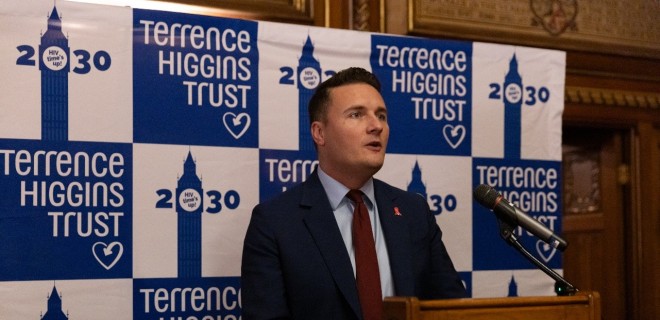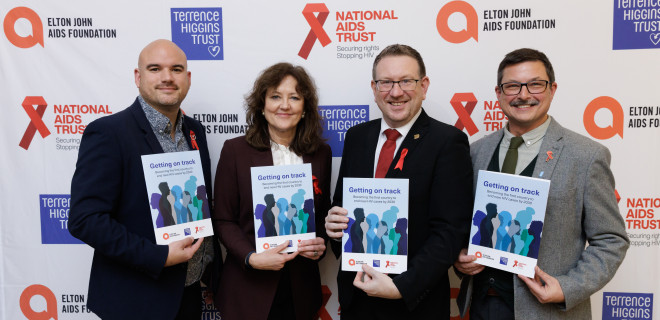It’s now scientifically possible to end new cases of HIV by 2030 but we need a robust, comprehensive plan that leaves no one behind if we are to make this a reality.
Right now the Westminster Government is writing its new HIV Action Plan which will set the course towards the 2030 goal in England. We have one chance to get this right – we need your help.
That’s why we’ve launched our brand new campaign alongside National AIDS Trust and Elton John AIDS Foundation, which invites our supporters to contact their MP and ask them to write to the Health Secretary, Matt Hancock.
In the letter, we’re asking the Government to commit to the following:
- Funding for opt-out HIV testing across the NHS.
- Free at-home HIV testing available nationwide all year round.
- Pre-exposure prophylaxis (PrEP) availability beyond sexual health clinics.
- Additional resources for health promotion programmes.
- Action to reduce late HIV diagnosis.
- A new campaign against HIV stigma.
- Mental health support available for those living with HIV.
Within just a few days of launching the campaign platform, we’ve had hundreds of people take action and email their MP.
To kick off the campaign we’re delighted to have Chair of the All-Party Parliamentary Group, Stephen Doughty MP, and the two MPs who served on our HIV Commission, Steve Brine MP and Wes Streeting MP sign a joint letter to the Health Secretary.
The governments in Scotland and Wales have also made pledges to end new cases of HIV by 2030 – something which we welcome. We’re asking Governments across the UK to work together, pull resources, and help turn the dial on HIV.
Please note this campaign action is now closed.
You can read the joint letter below
Dear Secretary of State,
The United Kingdom’s response to the HIV epidemic over the last four decades has been a success story in both our scientific and cross-party endeavours. We support the Government’s target to end new domestic cases of HIV within the decade and it is vital that the huge progress seen, in particular among gay and bisexual men, is replicated across other groups impacted by the virus.
Channel 4’s drama It’s A Sin has shone a light on the tragic experiences faced by many people during the height of the epidemic and has inspired a new wave of public awareness about the realities of HIV in 2021. This has been long overdue and can hopefully help to turn the dial on the abhorrent level of misinformation about HIV and the stigma still faced by people living with HIV.
To reach the 2030 target, it’s vital the Government embeds the rich information and analysis from the national HIV Commission to inform the Department’s HIV Action Plan. We welcome your commitment to publishing the plan this year. The Action Plan needs to be bold and ambitious.
Therefore, we support the calls from Terrence Higgins Trust, National AIDS Trust and Elton John AIDS Foundation that the HIV Action Plan must include the following:
- Funding for opt-out HIV testing across the NHS. When an individual presents at A&E, registers at a GP practice, and the NHS otherwise takes a blood sample, a test for HIV should be routinely undertaken, unless the person chooses to opt out. This is already standard practice within maternity units and has resulted in a near elimination of vertical transmission of HIV in the UK.
- Free at-home HIV testing should be available nationwide all year round. At present this is only the case during National HIV Testing Week and otherwise dependent on local authority provision.
- Pre-exposure prophylaxis (PrEP) availability beyond sexual health clinics. This drug is a game-changer in the fight against HIV but data from the NHS England PrEP Impact Trial showed only 4% of participants were not gay and bisexual men; that is despite heterosexual people accounting for nearly half of new HIV diagnoses. PrEP provision should be negotiated into the Core GP contract, available in pharmacies (via a Patient Group Direction). We need to raise awareness and increase access in all communities, but especially Black African communities, women, trans people and migrants, where awareness is currently lowest.
- A step change in targeted health promotion programme. Additional resources for HIV prevention and HIV testing campaigns.
- Action to reduce late HIV diagnosis. In 2019, 42% of all new HIV diagnoses were made at a late stage. This rises to over 50% among Black African heterosexuals. Late diagnosis leads to worse health outcomes for individuals, potential additional onward transmissions, and avoidable costs to the NHS. These cases must all be investigated as serious incidents within the NHS to improve practice and support earlier diagnosis.
- A new anti-HIV stigma campaign. The Don’t Die of Ignorance campaign undoubtedly saved lives. However, it has also tainted public awareness and understanding of HIV in modern times. HIV is no longer a death sentence and now advances in medicine mean that 97% of those with HIV on treatment are virally suppressed or ‘undetectable’, which means they can’t pass the virus on. Ongoing stigma impacts people living with HIV, including in employment, their access to services and relationships. It remains a stubborn barrier to testing for HIV. As well as a new anti-stigma programme, it’s also vital new Relationships & Education lessons in England provide young people with accurate and up-to-date information about HIV.
- Mental health support available for those living with HIV. People living with HIV are twice as likely to experience poor mental health than the wider population, including depression and anxiety. Despite this, access to mental health support remains inconsistent and generic services do not suffice. All HIV clinics need access to a psychological or mental health professional within their multidisciplinary teams.
While the Commission’s recommendations focused on England, to make them happen, and maximise effectiveness, we hope that the Department for Health and Social Care will also coordinate constructively with the devolved governments and health services in Scotland, Wales and Northern Ireland in this common endeavour.
We would be very grateful if you can comment on these calls and if you could provide an update on progress regarding the development of the HIV Action Plan, including any timescales.
Yours sincerely,
Stephen Doughty MP, Chair, APPG on HIV/AIDS
Steve Brine MP, Member, HIV Commission
Wes Streeting MP, Member, HIV Commission



